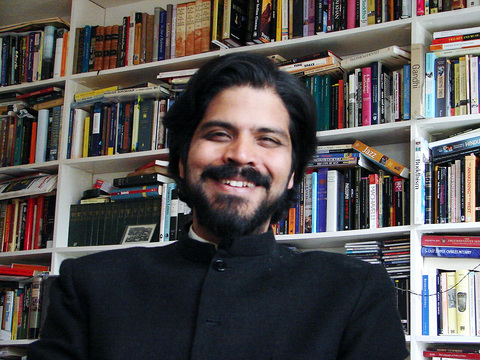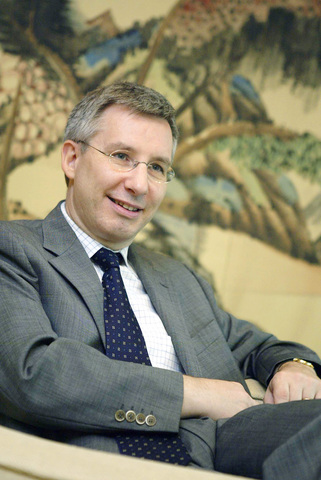Lung Ying-tai (龍應台) is disillusioned with Taiwan's political scene. Fed up with the constant partisan bickering and lunch-box battles in the legislature, the founder and president of the Lung Ying-tai Cultural Foundation (龍應台文化基金會) — a non-governmental organization (NGO) based in Taipei — hopes to provide an antidote to Taiwan's political chaos through hosting a series of lectures called Taipei Salon (台北沙龍). The lectures are conducted in English.
Begun last year, Lung's idea combines the French institution of literary salons with modern ideas on how to create a civil society — where an informed citizenry is empowered to make intelligent voting decisions, participate in politics and hold government and industry to account.
"[We] want to have an impact on society through intellectual discussion ... away from [the] narrow path of political fighting or reform," Lung said in an interview.

Creating a civil society is something that Lung knows a lot about. Appointed Taipei City's first cultural csar in 1999, during her four-year term she designed and implemented a cultural policy that increased the visibility of the arts in the city. With 15 book titles to her name, the current chair of arts and humanities at Tsing Hua University frequently publishes critical essays in European magazines and newspapers on both sides of the Taiwan Strait.
This month's lectures begin tomorrow with Jean-Claude Poimboeuf, Director of French Institute in Taipei, who will discuss how the French maintain their unique cultural identity in the age of globalization.
On March 17, Pankaj Mishra, a novelist and contributor to the New York Times, will talk about India's path to democracy. This month's series will end on March 24 with Julian Nida-Ruemelin — professor of political theory and philosophy at the University of Munich and a former minister of culture — who will discuss the relationship between globalization and democracy.

PHOTOS COURTESY OF LUNG yINGTAI CULTURAL FOUNDATION
Past speakers include David Plott, the former editor-in-chief of The Far Eastern Economic Review and current professor of journalism at the University of Hong Kong, and Jurgen Gerbig, Director of the German Cultural Center in Taipei.
By conducting the lectures in English, Lung hopes that foreigners will attend the lectures and participate in the discussions.
"I suspect [expats] have been closed up — because of the language barrier — in their own circles, which is not fair because they are citizens of the city," she said. "But so far we have not been able to reach the expat community because we don't know where they are."
Though foreigners are invited to participate, the youth of Taiwan are the real focus of Lung's salon.
"We want to get in touch with the younger generation," she said. "We are disappointed with anyone over 40 — so we decided to carry on a dialogue with people under 40," she added jokingly.
"We want to … cultivate the minds of the younger generation so that they are open-minded ... are concerned about global issues [and] ... have compassion for the weaker, whether in terms of income, resources, or in environmental areas — global citizenship in other words.
Though a tall order, Lung has found remarkable success with Taipei Salon. The last two lectures saw the auditorium at Yuehan Hall (月涵堂) packed to capacity with everyone from high school students to young professionals.
In addition to Taipei Salon, Lung's foundation has also set up a Thinkers Salon (思沙龍), a club with seminars conducted in Chinese that exposes participants to different cultures throughout the world. Under the title "What you do not know" (你所不知道的), it has covered topics such as Latin America, North and South Korea and the conflicts between the Israelis and Palestinians.
By doing so, Lung believes the youth of Taiwan will come to see they have the power to create an efficient civil society, thus furthering the island's democratization.
"We have to … focus on the younger generation and that kind of idea leads us to do what we are doing now," she said.

That US assistance was a model for Taiwan’s spectacular development success was early recognized by policymakers and analysts. In a report to the US Congress for the fiscal year 1962, former President John F. Kennedy noted Taiwan’s “rapid economic growth,” was “producing a substantial net gain in living.” Kennedy had a stake in Taiwan’s achievements and the US’ official development assistance (ODA) in general: In September 1961, his entreaty to make the 1960s a “decade of development,” and an accompanying proposal for dedicated legislation to this end, had been formalized by congressional passage of the Foreign Assistance Act. Two

Despite the intense sunshine, we were hardly breaking a sweat as we cruised along the flat, dedicated bike lane, well protected from the heat by a canopy of trees. The electric assist on the bikes likely made a difference, too. Far removed from the bustle and noise of the Taichung traffic, we admired the serene rural scenery, making our way over rivers, alongside rice paddies and through pear orchards. Our route for the day covered two bike paths that connect in Fengyuan District (豐原) and are best done together. The Hou-Feng Bike Path (后豐鐵馬道) runs southward from Houli District (后里) while the

On March 13 President William Lai (賴清德) gave a national security speech noting the 20th year since the passing of China’s Anti-Secession Law (反分裂國家法) in March 2005 that laid the legal groundwork for an invasion of Taiwan. That law, and other subsequent ones, are merely political theater created by the Chinese Communist Party (CCP) to have something to point to so they can claim “we have to do it, it is the law.” The president’s speech was somber and said: “By its actions, China already satisfies the definition of a ‘foreign hostile force’ as provided in the Anti-Infiltration Act, which unlike

Mirror mirror on the wall, what’s the fairest Disney live-action remake of them all? Wait, mirror. Hold on a second. Maybe choosing from the likes of Alice in Wonderland (2010), Mulan (2020) and The Lion King (2019) isn’t such a good idea. Mirror, on second thought, what’s on Netflix? Even the most devoted fans would have to acknowledge that these have not been the most illustrious illustrations of Disney magic. At their best (Pete’s Dragon? Cinderella?) they breathe life into old classics that could use a little updating. At their worst, well, blue Will Smith. Given the rapacious rate of remakes in modern